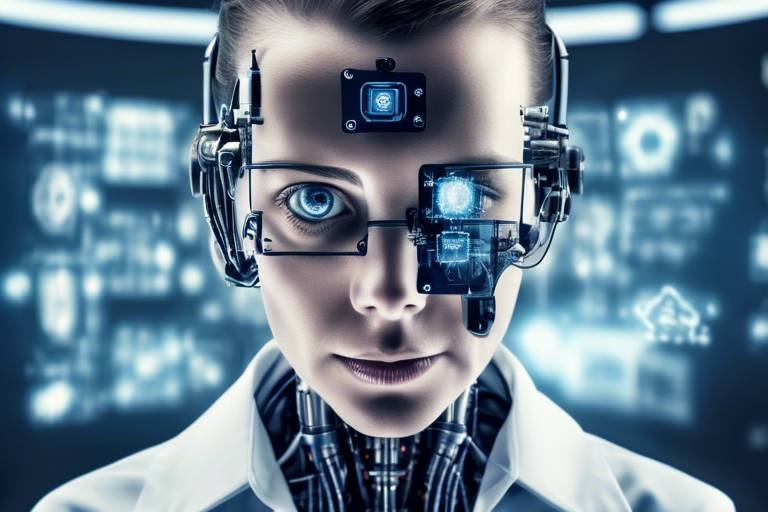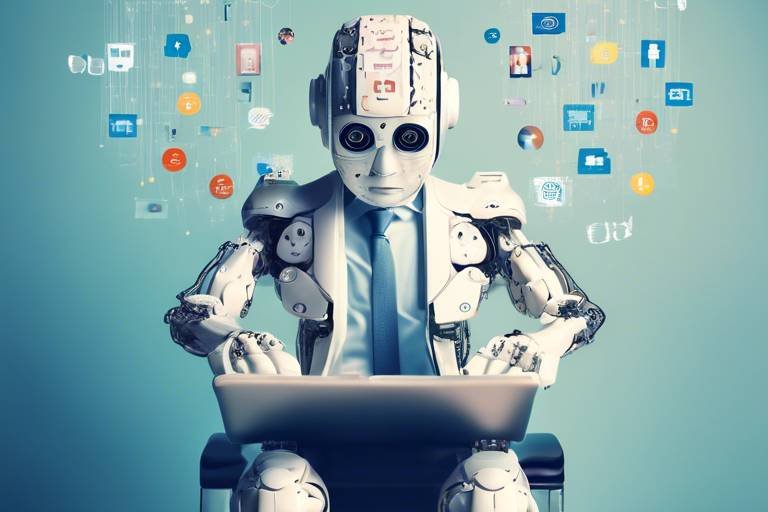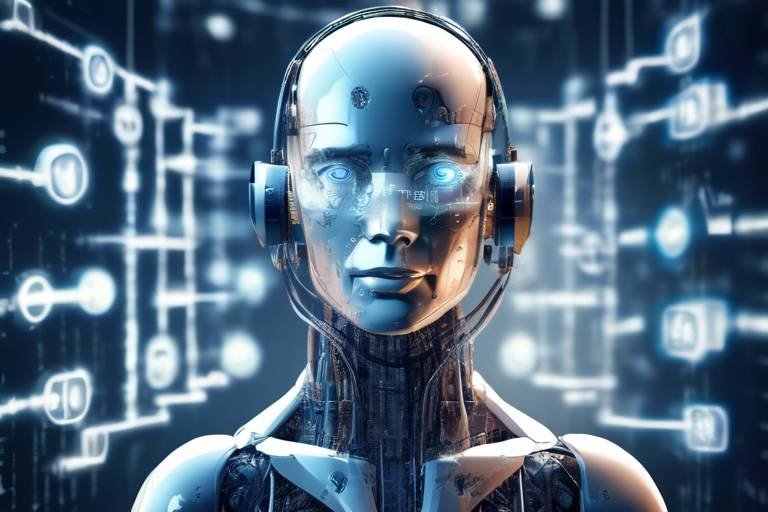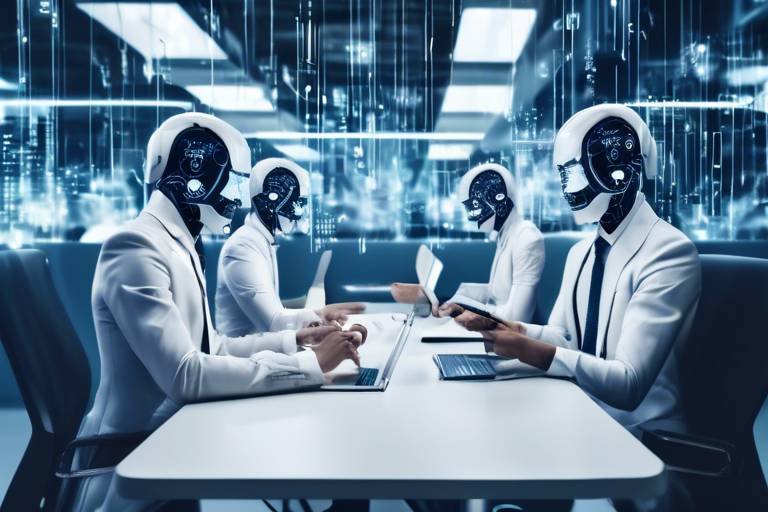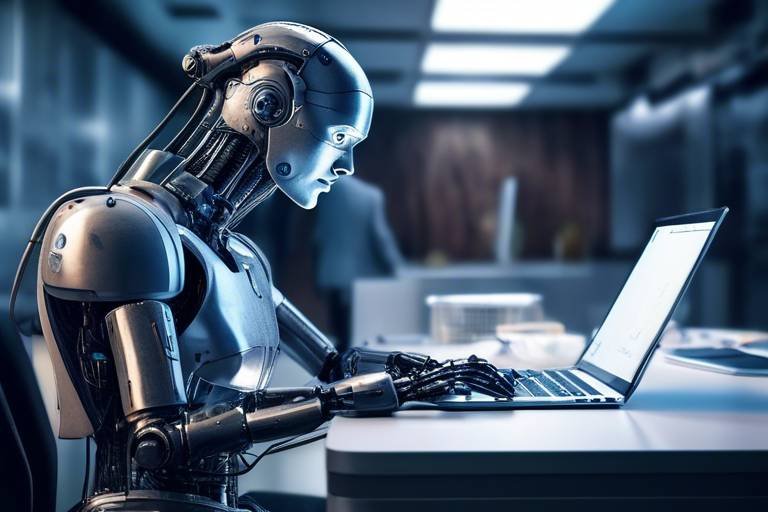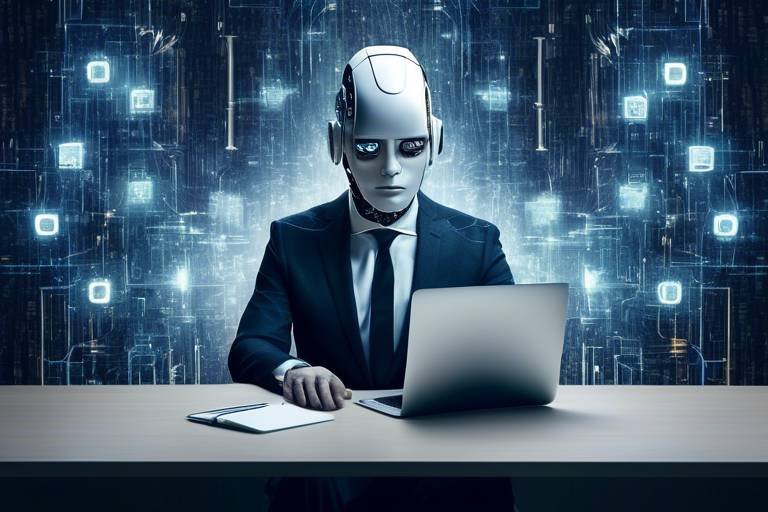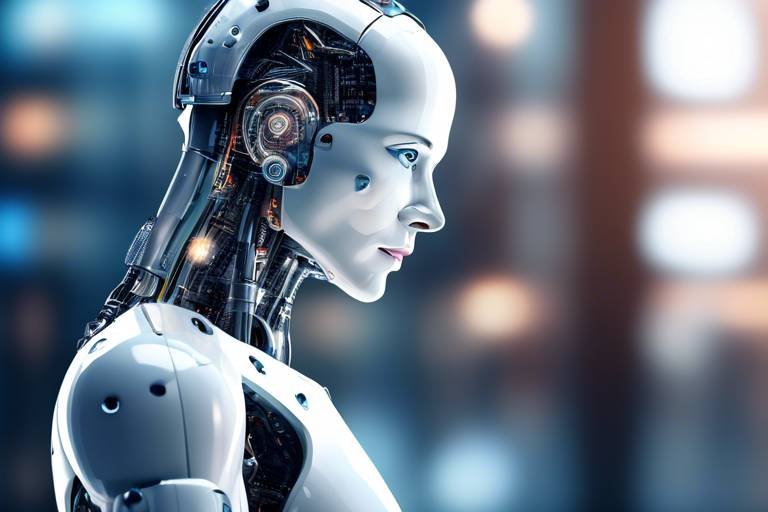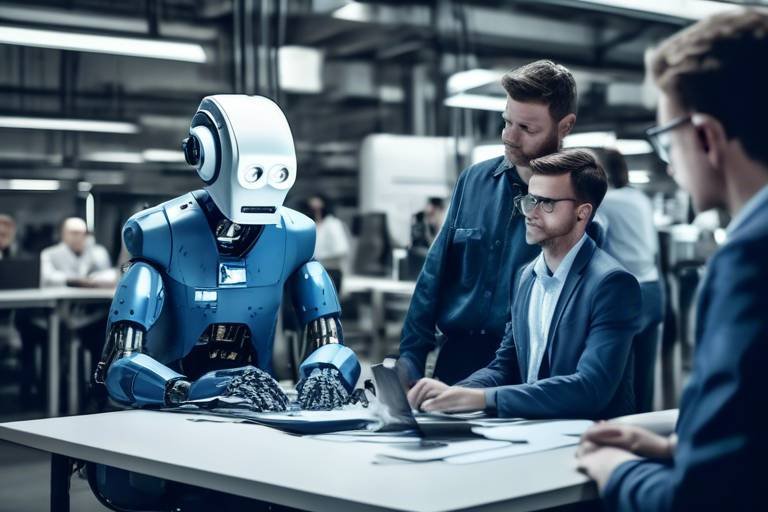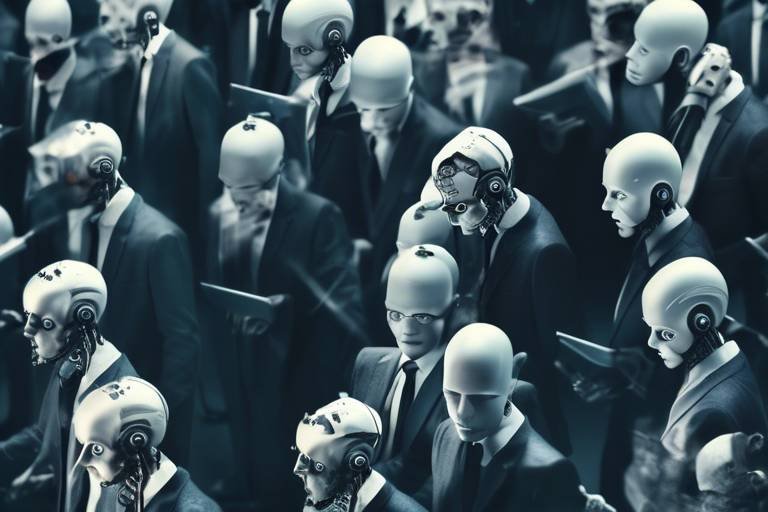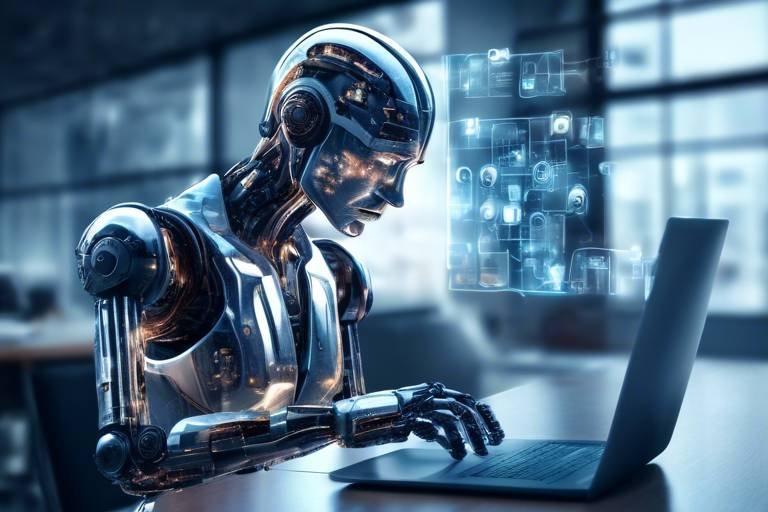A Peek into the Future: How AI might Dictate Careers
As we stand on the brink of a technological revolution, it’s hard not to feel a mix of excitement and apprehension about the role of artificial intelligence (AI) in shaping our future careers. Imagine waking up in a world where machines can perform tasks that once required human creativity and intuition. This isn't just a scene from a science fiction movie; it's the reality we are heading towards. The question is: how will AI dictate the careers of tomorrow? Will it be a friend or a foe to the workforce?
AI is already making waves in various industries, transforming the way we work and interact with technology. From smart assistants that help us manage our schedules to algorithms that analyze vast amounts of data in seconds, the presence of AI is undeniable. As this technology continues to evolve, it’s essential for us to understand its implications on our professional lives. Will we see a rise in job opportunities, or will many of us find ourselves displaced by machines? This article aims to explore the multifaceted impact of AI on career paths, highlighting both the opportunities it brings and the challenges it poses.
In a world increasingly dominated by AI, traditional job roles are being reshaped, requiring a reevaluation of what it means to have a career. The integration of AI into the workplace is not just about replacing human labor; it’s about enhancing productivity and creating new avenues for innovation. However, this transformation comes with its own set of challenges. Workers must adapt to new technologies and embrace a mindset of continuous learning. The future workforce will need to be agile, ready to pivot as industries evolve.
As we delve deeper into this topic, we will examine how different sectors are being affected by AI, the skills that will be in demand, and the importance of lifelong learning. The landscape of employment is shifting, and understanding these changes is crucial for anyone looking to thrive in the careers of the future.
As AI technology advances, its integration into workplaces is becoming increasingly prevalent, reshaping job roles and responsibilities across industries, and necessitating a reevaluation of traditional career paths. With AI taking over repetitive and mundane tasks, professionals are now freed up to focus on more complex and creative aspects of their jobs. This shift not only enhances job satisfaction but also boosts overall productivity. However, it also raises questions about job security and the need for workers to continually update their skills.
While AI threatens to displace certain jobs, it also has the potential to create new roles that require human oversight and creativity, leading to a dynamic shift in employment landscapes. For instance, as machines take over routine tasks, there will be a growing demand for roles that involve strategic thinking, emotional intelligence, and creative problem-solving. The challenge lies in finding a balance between embracing AI advancements and ensuring that the workforce is equipped to handle the changes.
Certain sectors, such as manufacturing, healthcare, and finance, are experiencing significant transformations due to AI, prompting workers to adapt or reskill to remain relevant in their fields. Understanding how AI is reshaping these industries can provide valuable insights into potential career paths and opportunities.
Automation and robotics are revolutionizing manufacturing processes, increasing efficiency but also leading to a decline in traditional labor roles, thus requiring workers to embrace new technologies. The manufacturing industry is seeing a shift from manual labor to more technical roles, such as robotics technicians and data analysts, which are essential for managing AI systems.
AI is enhancing diagnostic capabilities and patient care, creating opportunities for healthcare professionals to focus on complex decision-making and patient interaction rather than routine tasks. With AI tools assisting in everything from patient monitoring to predictive analytics, healthcare workers can provide more personalized care, improving patient outcomes and satisfaction.
As AI reshapes job markets, workers must develop skills in areas such as data analysis, critical thinking, and emotional intelligence to thrive in an increasingly automated environment. These skills will not only help individuals remain competitive but also enable them to leverage AI tools effectively, turning potential threats into opportunities.
Continuous education and skill development will be essential for professionals to adapt to the evolving demands of the job market influenced by AI advancements. Embracing a mindset of lifelong learning will empower individuals to stay relevant and seize new opportunities as they arise.
With the rise of digital education, online platforms provide accessible resources for individuals seeking to upskill or reskill, offering flexibility in learning opportunities. Whether through MOOCs (Massive Open Online Courses) or specialized training programs, the options are vast and cater to various learning styles and needs.
Companies are increasingly investing in training programs to help employees adapt to AI technologies, ensuring their workforce remains competitive and capable of leveraging new tools effectively. By fostering a culture of continuous learning, organizations can not only enhance their productivity but also improve employee morale and retention.
- Will AI take away all jobs? - While AI will automate certain tasks, it will also create new opportunities that require human skills.
- What skills should I develop to stay relevant? - Focus on skills like data analysis, critical thinking, and emotional intelligence.
- How can I continue learning while working? - Online learning platforms and corporate training initiatives can help you balance work and education.

The Rise of AI in the Workplace
As we stand on the brink of a technological revolution, the rise of artificial intelligence (AI) in the workplace is nothing short of astonishing. Imagine walking into an office where your computer can predict your needs before you even articulate them. Sounds like science fiction, right? But this is rapidly becoming our reality. AI is not just a buzzword; it's a powerful force reshaping job roles and responsibilities across various industries. From automating mundane tasks to providing insightful data analysis, AI is changing the way we work, and it's doing so at an unprecedented pace.
One of the most significant shifts we're witnessing is the integration of AI into everyday tasks. Take customer service, for instance. Chatbots powered by AI are now handling inquiries that once required human intervention. This not only speeds up response times but also allows human employees to focus on more complex issues that require critical thinking and emotional intelligence. It's a classic case of the machines taking over the repetitive tasks, enabling humans to engage in more meaningful work. The question arises: will this lead to the obsolescence of traditional roles or will it create opportunities for growth?
As AI continues to evolve, it becomes imperative for businesses to adapt. This adaptation might mean redefining job descriptions and expectations. For example, roles that once required manual data entry are shifting towards data interpretation and strategic decision-making. Employees are now expected to work alongside AI, utilizing its capabilities to enhance productivity. This fusion of human creativity and machine efficiency can result in a powerhouse of innovation. Companies that embrace this change will find themselves at the forefront of their industries, while those that resist may struggle to keep up.
Moreover, the rise of AI in the workplace is prompting a reevaluation of traditional career paths. No longer can workers rely solely on their existing skill sets. The demand for new skills is on the rise, and the ability to adapt is becoming a crucial asset. Workers must now consider not just what they know, but how they can leverage AI to enhance their roles. This brings us to the importance of lifelong learning. Continuous education is no longer a luxury; it’s a necessity for survival in this rapidly changing job landscape.
In conclusion, the rise of AI in the workplace is a double-edged sword. While it poses challenges such as potential job displacement, it also opens up a realm of opportunities for those willing to adapt and learn. As we navigate this brave new world, the key will be to embrace change, harness the power of AI, and redefine what it means to work in an increasingly automated environment.
- How is AI changing job roles? AI is automating routine tasks, allowing employees to focus on more complex and creative responsibilities.
- Will AI replace jobs? While some jobs may be displaced, AI also creates new roles that require human skills like oversight and creativity.
- What skills are essential for the future workforce? Skills in data analysis, critical thinking, and emotional intelligence will be crucial as AI continues to evolve.

Job Displacement vs. Job Creation
As we dive into the intricate dance between job displacement and job creation in the age of AI, it’s essential to recognize the dual nature of this technological evolution. On one hand, we see certain roles becoming obsolete, often due to the efficiency and precision that AI brings to the table. Think about it: machines can now perform tasks that once required human hands, and they do so with a level of accuracy that’s hard to match. For instance, in manufacturing, robots are taking over assembly line jobs, which raises a critical question: what happens to the workers who once filled those positions?
However, before we throw our hands up in despair, let’s consider the flip side. While AI may be snatching away some jobs, it’s also paving the way for new opportunities that didn’t exist before. With technology advancing at lightning speed, new roles are emerging that require a blend of human creativity and technological proficiency. For example, think of the rise of data analysts, AI trainers, and even ethicists who specialize in the moral implications of AI. These positions demand a human touch—something that machines simply can’t replicate.
To illustrate this point, let’s look at a few sectors where this tug-of-war is particularly evident:
| Sector | Jobs at Risk | New Opportunities |
|---|---|---|
| Manufacturing | Assembly line workers | Robotics technicians, AI maintenance specialists |
| Healthcare | Radiology technicians | AI health analysts, telemedicine coordinators |
| Finance | Bank tellers | Financial analysts, AI compliance officers |
This table highlights how the landscape is shifting. In manufacturing, for example, while traditional assembly line jobs are dwindling, the demand for skilled technicians who can maintain and program robots is on the rise. Similarly, in healthcare, AI is taking over routine tasks, freeing up professionals to focus on more complex patient interactions, thus enhancing the quality of care.
Now, it’s vital to address the elephant in the room: the fear of job loss. It’s natural to feel anxious about the future, especially when you hear stories of entire industries being transformed overnight. However, embracing change rather than resisting it can be the key to thriving in this new world. By focusing on upskilling and reskilling, individuals can position themselves to not just survive but flourish in an AI-driven economy.
In conclusion, while AI may disrupt the workforce, it simultaneously offers a wealth of new opportunities for those willing to adapt. The challenge lies in finding the right balance between harnessing the power of AI and ensuring that human ingenuity remains at the forefront of innovation. After all, the future isn’t just about machines; it’s about how we choose to integrate them into our lives.
- Will AI replace all jobs? - While AI will automate certain tasks, many jobs will evolve rather than disappear, creating new roles that require human skills.
- What skills should I develop to stay relevant? - Focus on skills like data analysis, critical thinking, and emotional intelligence, which are increasingly valuable in an AI-driven world.
- How can I adapt to the changes brought by AI? - Consider continuous learning through online courses and corporate training programs to stay updated with technological advancements.
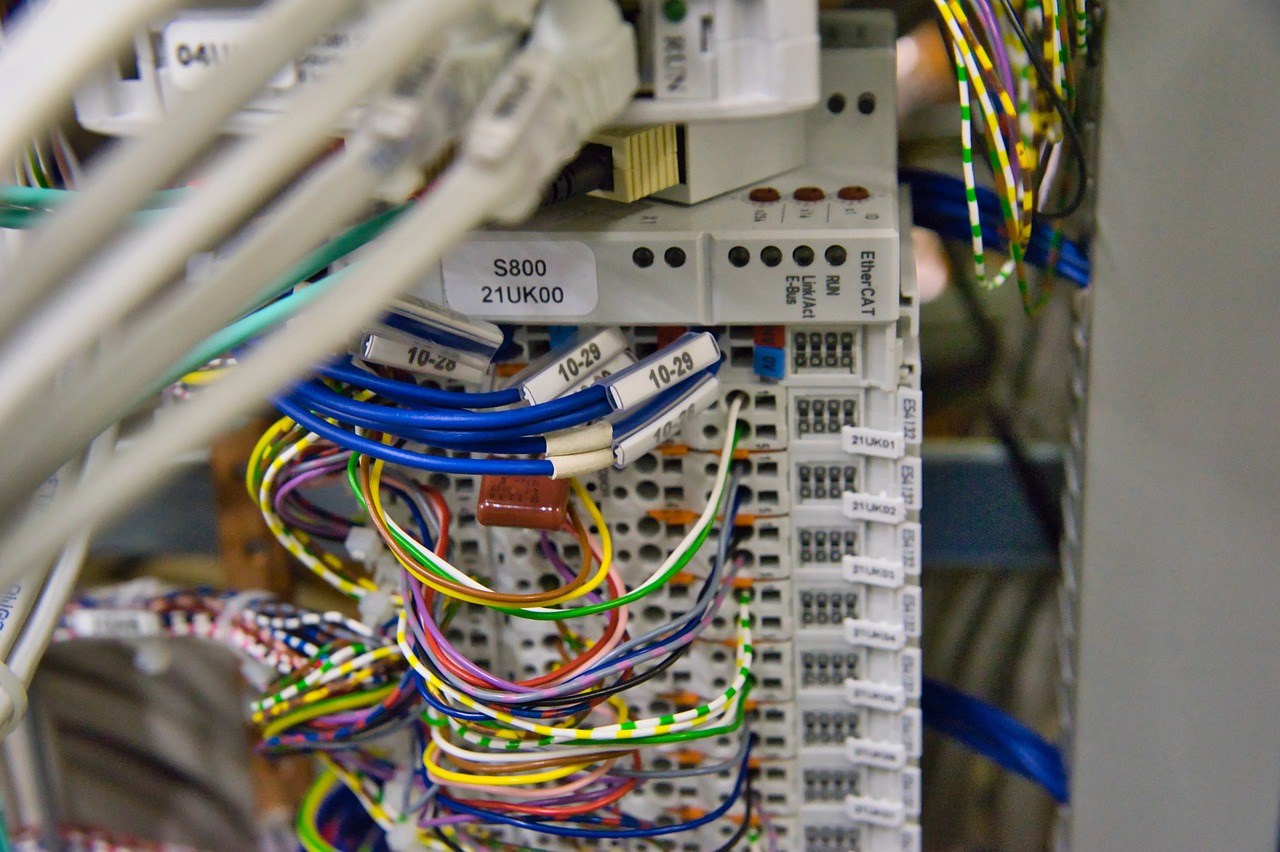
Industries Most Affected by AI
The advent of artificial intelligence (AI) is not just a passing trend; it’s a seismic shift that is reshaping various industries in profound ways. As we dive into the realms of manufacturing, healthcare, and finance, we can clearly see how AI is both a catalyst for innovation and a disruptor of traditional job roles. It's a bit like a double-edged sword, isn’t it? On one side, we have efficiency and enhanced capabilities, while on the other, there’s the looming threat of job displacement. Let’s explore the industries that are feeling the heat from AI integration.
In the manufacturing sector, automation has taken center stage. Robots are now performing tasks that were once the domain of human workers, such as assembly line work and quality inspections. This shift is akin to watching a well-rehearsed dance where the human element is gradually being replaced by machines. While productivity has soared, the demand for traditional labor has diminished, prompting a critical need for workers to adapt. Those who can harness AI technologies will find themselves in a prime position, but those who resist change may find their careers sidelined.
Moving on to healthcare, AI is revolutionizing patient care and diagnostics. Imagine walking into a hospital where AI algorithms analyze your medical history and symptoms in seconds, providing doctors with insights that enhance treatment plans. This is not science fiction; it’s happening now! Healthcare professionals are being empowered to focus on what truly matters—patient interaction and complex decision-making—rather than getting bogged down with routine tasks. However, this transition also demands that healthcare workers acquire new skills to work alongside AI systems effectively.
Finally, let’s talk about finance. AI is transforming how financial institutions operate, from risk assessment to fraud detection. Algorithms can analyze vast amounts of data at lightning speed, identifying patterns that humans might miss. This capability is like having a super-sleuth on your team! However, it also means that roles traditionally filled by humans are evolving. Financial analysts are now required to be data-savvy and tech-oriented, embracing continuous learning to stay relevant in a rapidly changing landscape.
In summary, while AI is making waves across these industries, it’s essential to recognize that this evolution is not merely about job loss. It’s about the emergence of new roles that require human oversight, creativity, and emotional intelligence. Those who are willing to adapt and embrace lifelong learning will not only survive but thrive in this new era.
- Q: Will AI completely replace human jobs?
A: While AI may automate certain tasks, it is more likely to change job roles rather than eliminate them entirely. New opportunities will arise that require human skills. - Q: What skills should I develop to stay relevant in an AI-driven job market?
A: Focus on skills like data analysis, critical thinking, emotional intelligence, and adaptability to new technologies. - Q: How can I reskill or upskill in response to AI advancements?
A: Consider online learning platforms, workshops, and corporate training initiatives that focus on AI technologies and their applications in your industry.
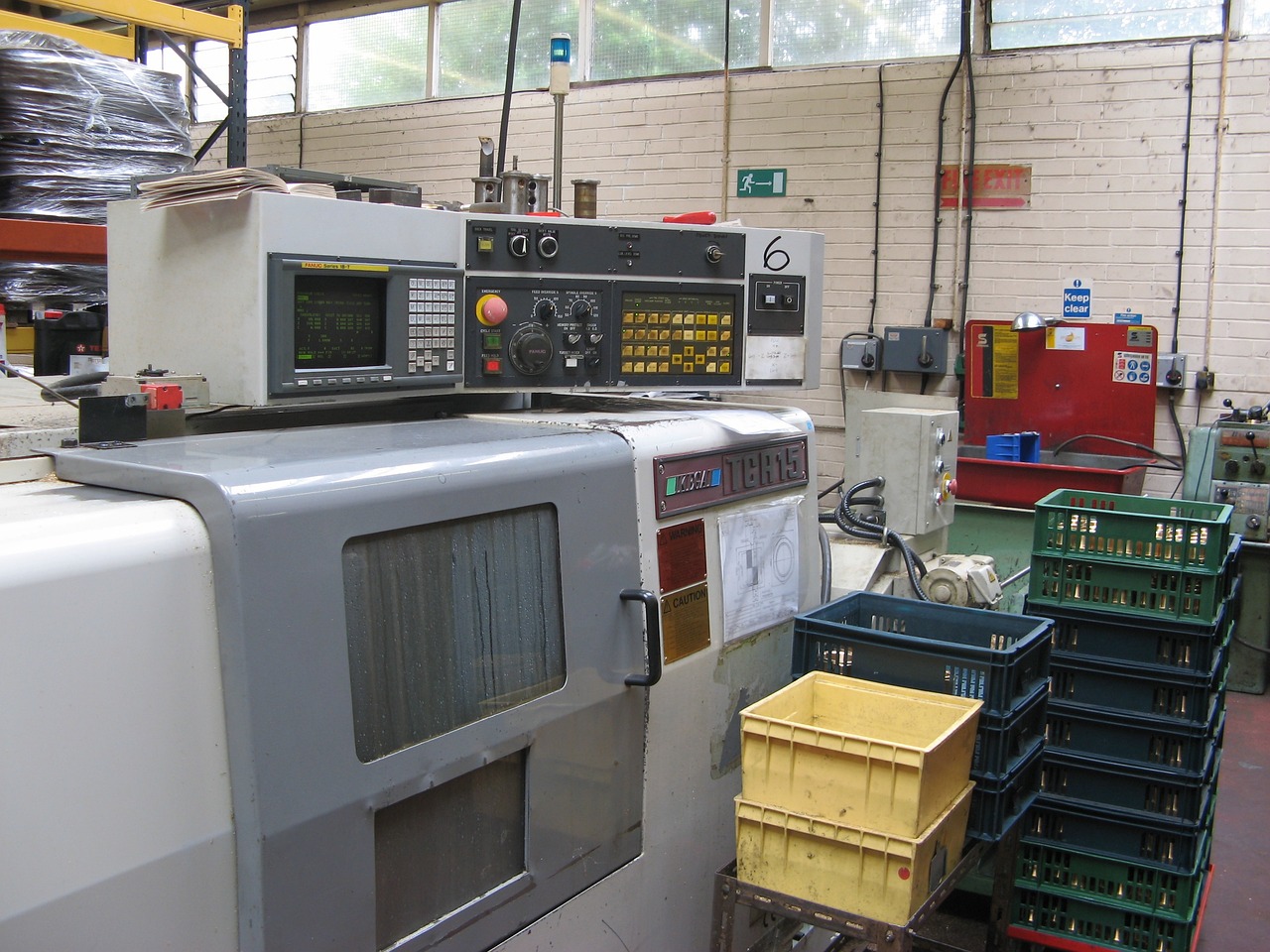
Manufacturing Innovations
In recent years, the manufacturing sector has undergone a seismic shift, largely driven by the rapid advancements in artificial intelligence and automation. These innovations are not just reshaping how products are made; they are redefining the very essence of what it means to work in manufacturing. Imagine a factory floor where robots work alongside humans, each complementing the other's strengths. This is no longer a scene from a futuristic movie; it’s a reality that many manufacturers are embracing today.
At the heart of this transformation lies the concept of smart manufacturing. This approach leverages interconnected machines and data analytics to optimize production processes. By utilizing the Internet of Things (IoT), manufacturers can monitor equipment in real-time, predict maintenance needs, and minimize downtime. This level of efficiency not only boosts productivity but also enhances product quality, leading to higher customer satisfaction.
However, while automation can lead to increased efficiency, it also poses challenges. Traditional labor roles are declining as machines take over repetitive tasks. Workers who once performed manual assembly may find their jobs at risk. This shift necessitates a profound change in workforce skills. To remain competitive, employees must now embrace new technologies and adapt to an evolving landscape. Here are some key areas where workers can focus their skill development:
- Technical Skills: Understanding how to operate and troubleshoot automated systems is crucial.
- Data Analysis: The ability to interpret data generated by smart machines will be invaluable.
- Collaboration with AI: Learning how to work alongside AI tools to enhance productivity will set workers apart.
Moreover, manufacturers are investing heavily in robotics and artificial intelligence to enhance their operations. For instance, robots can now perform complex tasks such as welding, painting, and even assembling components with a precision that far exceeds human capabilities. This not only speeds up production but also reduces the likelihood of errors, resulting in significant cost savings for companies.
Yet, it’s not all about machines taking over. There’s a growing recognition that human oversight is essential. Workers are needed to manage these sophisticated systems, ensuring that everything runs smoothly. This shift creates a new category of jobs that require a blend of technical knowledge and creative problem-solving skills. In essence, the manufacturing landscape is evolving from a purely labor-intensive environment to one that values innovation and creativity.
In conclusion, the innovations in manufacturing, driven by AI and automation, present both challenges and opportunities. While some traditional roles may disappear, new ones are emerging that require a different skill set. The key for workers is to be proactive in their learning and adaptation, ensuring they remain relevant in this fast-paced industry. The future of manufacturing is bright, and those who embrace change will be the ones to thrive.
Q: Will AI completely replace human jobs in manufacturing?
A: While AI will automate many tasks, it will also create new roles that require human oversight and creativity. Workers will need to adapt and learn new skills.
Q: What skills should I focus on to stay relevant in the manufacturing industry?
A: Key skills include technical proficiency with automated systems, data analysis, and the ability to collaborate effectively with AI technologies.
Q: How can companies support their employees during this transition?
A: Companies can invest in training programs and continuous education initiatives to help employees upskill and adapt to new technologies.

Healthcare Advancements
The healthcare industry stands on the brink of a revolution, thanks to the rapid advancements in artificial intelligence. Imagine walking into a hospital where machines not only assist doctors but also enhance patient care through precise diagnostics. This isn't science fiction; it's happening now! AI technologies are being integrated into various aspects of healthcare, fundamentally transforming how medical professionals operate and how patients receive care.
One of the most significant impacts of AI in healthcare is the enhancement of diagnostic capabilities. Traditional diagnostic methods often rely on the experience and intuition of healthcare providers, but AI algorithms can analyze vast amounts of data in mere seconds. For instance, AI can sift through thousands of medical images to identify abnormalities that even the most trained eye might miss. This not only speeds up the diagnostic process but also improves accuracy, leading to better patient outcomes. In fact, studies have shown that AI systems can outperform human radiologists in detecting certain conditions, such as tumors in mammograms.
Furthermore, AI is streamlining administrative tasks, allowing healthcare professionals to focus more on patient interaction and complex decision-making. Imagine a world where scheduling, billing, and patient records are managed by intelligent systems. This not only reduces the burden on healthcare staff but also minimizes errors and enhances the overall efficiency of healthcare delivery. With AI handling routine tasks, doctors and nurses can dedicate more time to what truly matters: patient care.
However, the integration of AI in healthcare does not come without challenges. It raises questions about data privacy, ethical considerations, and the need for human oversight in critical situations. For instance, while AI can provide recommendations based on data, the final decision-making should always involve a human touch, ensuring that patient care remains compassionate and personalized.
As we look to the future, the role of healthcare professionals will evolve. They will need to be adept at working alongside AI technologies, leveraging these tools to enhance their practice. This means that ongoing training and education will be crucial. Healthcare workers must not only understand how to use AI systems but also how to interpret the data they provide. This shift emphasizes the importance of emotional intelligence and critical thinking, skills that AI cannot replicate.
In summary, the advancements in AI are poised to revolutionize healthcare by improving diagnostics, streamlining operations, and enhancing the patient experience. As we embrace these changes, it's essential to remember that technology should augment human capabilities, not replace them. The future of healthcare will be a collaborative effort between humans and machines, creating a healthcare environment that is more efficient, effective, and empathetic.
- How is AI improving diagnostics in healthcare? AI systems can analyze vast amounts of medical data quickly, identifying patterns and abnormalities that may be missed by human practitioners.
- What are the ethical concerns surrounding AI in healthcare? Issues such as data privacy, accountability, and the need for human oversight in critical decision-making processes are significant concerns.
- Will AI replace healthcare professionals? While AI will automate certain tasks, it is expected to enhance rather than replace the roles of healthcare professionals, allowing them to focus on patient care.
- What skills will healthcare workers need in an AI-driven environment? Skills such as emotional intelligence, critical thinking, and the ability to interpret AI-generated data will be essential for future healthcare professionals.

Skills for the Future Workforce
As we navigate the uncharted waters of an AI-driven job market, it becomes increasingly clear that certain skills will be paramount for success. The future workforce will not only need to adapt to new technologies but also cultivate a unique blend of abilities that set them apart from machines. In this rapidly evolving landscape, the importance of data analysis, critical thinking, and emotional intelligence cannot be overstated.
First and foremost, data analysis is becoming the backbone of decision-making in various industries. As AI systems churn out massive amounts of data, the ability to interpret and analyze this information will be a game-changer. Imagine being a detective, sifting through clues to solve a mystery; that's what data analysts do, but with numbers and trends. They transform raw data into actionable insights, allowing businesses to make informed choices and stay ahead of the competition.
Next up is critical thinking. In a world where AI can automate routine tasks, humans will need to excel in tasks that require deep thinking and problem-solving. It's akin to being a chess player; while the computer may calculate moves faster, it lacks the intuition and foresight that a human brings to the game. Critical thinking enables professionals to evaluate situations, consider multiple perspectives, and devise innovative solutions that machines simply cannot replicate.
Lastly, let's not forget about emotional intelligence. In an era dominated by technology, the human touch is more valuable than ever. Emotional intelligence involves understanding and managing one’s emotions while also empathizing with others. This skill is crucial in roles that require teamwork, leadership, and customer interaction. Picture a manager who can read the room and motivate their team even during challenging times—this is the power of emotional intelligence.
To thrive in the future workforce, individuals must embrace a mindset of lifelong learning. This means continuously seeking out new knowledge and skills, whether through formal education, online courses, or self-directed learning. The landscape of work is changing so rapidly that what you learn today might not be sufficient tomorrow. Therefore, keeping your skills sharp and relevant is not just an option; it’s a necessity.
In addition to these core skills, consider the following areas that will play a significant role in the future job market:
- Technical Proficiency: Familiarity with AI tools and software will be essential.
- Creativity: As automation takes over routine tasks, creative problem-solving will be a key differentiator.
- Adaptability: The ability to pivot and adjust to new challenges is vital in a fast-paced environment.
In conclusion, the future workforce will be defined by a unique blend of skills that emphasize human creativity, emotional insight, and analytical prowess. By focusing on these areas, individuals can position themselves as invaluable assets in an AI-enhanced world. So, are you ready to embrace the future and equip yourself with the skills that will keep you relevant and successful?
Q: What skills will be most important in the future workforce?
A: Skills such as data analysis, critical thinking, and emotional intelligence will be crucial for success in an AI-driven job market.
Q: How can I develop these skills?
A: Continuous learning through online courses, workshops, and practical experience will help you build these essential skills.
Q: Is emotional intelligence really that important?
A: Yes, emotional intelligence is vital for roles that involve teamwork and leadership, as it helps foster better relationships and communication.

The Importance of Lifelong Learning
In an era where change is the only constant, lifelong learning has emerged as a vital component for career success and personal development. With the rapid advancements in technology, particularly in fields like artificial intelligence, the skills that were once deemed essential can quickly become obsolete. This phenomenon raises an important question: how can we ensure that we remain relevant in our careers? The answer lies in embracing a culture of continuous education and skill enhancement.
Lifelong learning is not just a buzzword; it's a mindset that encourages individuals to seek knowledge and skills throughout their lives. Whether through formal education, online courses, or self-directed study, the opportunities to learn are more abundant than ever. For instance, platforms like Coursera, Udacity, and LinkedIn Learning offer a plethora of courses ranging from data science to emotional intelligence, catering to various professional needs. This flexibility allows individuals to learn at their own pace and convenience, making it easier than ever to fit education into busy schedules.
Moreover, companies are recognizing the importance of fostering a learning culture within their organizations. Many forward-thinking businesses are investing in corporate training initiatives designed to upskill their workforce. These training programs not only equip employees with the latest tools and technologies but also enhance job satisfaction and retention rates. When employees feel that their employers are invested in their growth, they are more likely to stay motivated and engaged in their roles.
To illustrate the significance of lifelong learning, consider the following table that highlights the benefits of continuous education:
| Benefit | Description |
|---|---|
| Career Advancement | Continuous learning opens doors to new roles and promotions, enhancing career trajectories. |
| Adaptability | Workers who engage in lifelong learning can quickly adapt to changes in their industries. |
| Increased Confidence | Gaining new skills boosts confidence, enabling individuals to tackle challenges more effectively. |
| Networking Opportunities | Learning environments often foster connections with industry professionals, expanding one’s network. |
In conclusion, the importance of lifelong learning cannot be overstated. As we navigate through an increasingly automated world, the ability to learn, unlearn, and relearn will determine our success and satisfaction in our careers. Embracing this philosophy not only prepares us for the future but also enriches our lives, making us more informed and versatile individuals.
- What is lifelong learning? Lifelong learning refers to the ongoing, voluntary, and self-motivated pursuit of knowledge for personal or professional development.
- Why is lifelong learning important? It helps individuals adapt to changes in their careers, enhances job satisfaction, and opens up new opportunities for advancement.
- How can I start my lifelong learning journey? You can start by enrolling in online courses, attending workshops, or simply reading books and articles related to your field of interest.
- Are there any costs associated with lifelong learning? While some resources are free, many platforms offer paid courses. However, investing in your education can yield significant returns in your career.

Online Learning Platforms
In an era where knowledge is power, online learning platforms have emerged as a beacon of opportunity for those looking to adapt to the rapidly changing job market influenced by artificial intelligence. Imagine being able to pick up new skills or polish existing ones from the comfort of your own home, at your own pace, and on your own schedule. Sounds great, right? With the rise of digital education, platforms like Coursera, Udacity, and LinkedIn Learning have become essential tools for professional growth and development.
These platforms offer a plethora of courses ranging from data analysis to emotional intelligence, catering to the diverse needs of the modern workforce. For instance, if you're a marketing professional looking to harness the power of AI in your campaigns, you can find specialized courses that teach you how to use AI tools effectively. This kind of flexibility is crucial in a world where the only constant is change.
One of the best parts? Many online learning platforms provide certifications upon completion of courses, which can significantly enhance your resume. Employers are increasingly valuing continuous learning and adaptability, and having a certification in a relevant field can set you apart from other candidates. Furthermore, the interactive nature of these courses often includes quizzes, projects, and peer discussions, making learning not just effective but also engaging.
Moreover, the accessibility of online learning platforms means that anyone, anywhere can take advantage of these resources. Whether you're a busy parent, a full-time employee, or someone looking to switch careers entirely, online education breaks down the barriers that traditional learning environments often impose. You can learn during your lunch break, late at night, or even while commuting, making it easier than ever to fit education into your life.
To illustrate the impact of online learning platforms, consider the following table that highlights some of the key features and benefits:
| Platform | Key Features | Benefits |
|---|---|---|
| Coursera | University-level courses, Specializations, Certificates | Recognized by employers, Flexible learning |
| Udacity | Nanodegree programs, Real-world projects | Hands-on experience, Industry-relevant skills |
| LinkedIn Learning | Short video courses, Personalized recommendations | Quick learning, Networking opportunities |
As we navigate through the complexities of the future job landscape, it’s clear that online learning platforms are not just a trend; they are a necessity. The ability to continuously learn and adapt will be the key to thriving in an increasingly automated world. So, whether you're looking to enhance your skill set or completely pivot your career, there’s no better time than now to dive into the world of online education!
- What are online learning platforms? Online learning platforms are digital platforms that offer courses and training programs across various subjects, allowing users to learn at their own pace.
- Are online courses recognized by employers? Yes, many online courses provide certifications that are recognized by employers, especially if they are from reputable institutions.
- Can I learn new skills while working full-time? Absolutely! Online learning platforms offer flexible schedules, making it easy to learn around your existing commitments.

Corporate Training Initiatives
In today's rapidly evolving job market, have become a vital component for businesses aiming to stay competitive. As artificial intelligence continues to reshape various industries, companies recognize the need to equip their employees with the necessary skills to thrive in an increasingly automated environment. This shift isn't just about keeping pace with technology; it's about fostering a culture of continuous learning that empowers employees to adapt and innovate.
Many organizations are investing heavily in training programs that focus on AI technologies and their applications. These initiatives often include a mix of workshops, online courses, and hands-on training. By offering diverse learning opportunities, companies can cater to different learning styles and ensure that all employees have access to the resources they need. For instance, a typical corporate training program might include:
- Workshops: Interactive sessions led by industry experts that provide practical insights into AI applications.
- Online Courses: Flexible learning modules that employees can complete at their own pace, covering topics such as data analysis and machine learning.
- Mentorship Programs: Pairing less experienced employees with seasoned professionals to foster knowledge sharing and skill development.
Moreover, companies are increasingly recognizing the importance of soft skills in conjunction with technical training. As AI takes over routine tasks, the demand for skills like emotional intelligence, critical thinking, and collaboration is on the rise. Training initiatives are thus evolving to include modules that enhance these skills, preparing employees for the complex interpersonal dynamics of the future workplace.
Another significant trend is the use of virtual reality (VR) and augmented reality (AR) in training programs. These technologies allow employees to engage in immersive learning experiences, simulating real-world scenarios where they can practice their skills without the fear of making mistakes. For example, healthcare professionals can use VR to simulate patient interactions, while manufacturing workers can practice operating machinery in a safe, controlled environment.
In addition to enhancing employee skills, corporate training initiatives can also lead to higher job satisfaction and retention rates. When employees feel that their employer is investing in their growth, they are more likely to remain loyal to the company. This loyalty not only reduces turnover costs but also fosters a more engaged and motivated workforce. As a result, companies that prioritize employee training are often seen as more attractive to potential hires, creating a positive feedback loop that benefits everyone involved.
To sum it up, corporate training initiatives are not merely a response to the challenges posed by AI; they represent a proactive approach to workforce development. By investing in their employees' skills and fostering a culture of learning, organizations can navigate the complexities of the future job market while reaping the benefits of a highly skilled and adaptable workforce.
1. Why are corporate training initiatives important in the age of AI?
Corporate training initiatives are crucial because they help employees develop the skills needed to work alongside AI technologies, ensuring they remain relevant and effective in their roles.
2. What types of training programs are most effective?
Effective training programs often combine workshops, online courses, and mentorship opportunities to address various learning styles and needs.
3. How can companies measure the success of their training initiatives?
Companies can measure success through employee feedback, skill assessments, and tracking performance metrics before and after training.
4. Are soft skills still relevant in an AI-driven workplace?
Absolutely! As AI takes over routine tasks, soft skills like emotional intelligence and critical thinking become increasingly important for collaboration and decision-making.
Frequently Asked Questions
- How is AI changing the job market?
AI is reshaping the job market by automating routine tasks and creating new roles that require human creativity and oversight. While some jobs may be displaced, others will emerge that focus on skills like critical thinking and emotional intelligence, making adaptability crucial.
- Which industries are most affected by AI?
Industries such as manufacturing, healthcare, and finance are experiencing significant changes due to AI. In manufacturing, automation is increasing efficiency, while in healthcare, AI is enhancing diagnostic capabilities, allowing professionals to focus more on patient interaction.
- What skills will be important for future careers?
To thrive in an AI-influenced job market, skills in data analysis, critical thinking, and emotional intelligence will be essential. Workers should also aim to develop adaptability and tech-savviness to keep pace with evolving technologies.
- Why is lifelong learning important in the age of AI?
Lifelong learning is crucial because the job market is constantly evolving with AI advancements. Continuous education helps professionals stay relevant and competitive, ensuring they can adapt to new tools and methodologies as they arise.
- What resources are available for upskilling?
There are numerous online learning platforms that offer courses for individuals looking to upskill or reskill. These platforms provide flexible learning opportunities that can fit into anyone's schedule, making it easier to keep learning.
- How are companies supporting employee training?
Many companies are investing in corporate training initiatives to help their employees adapt to AI technologies. These programs are designed to ensure that the workforce remains competitive and capable of effectively leveraging new tools.

